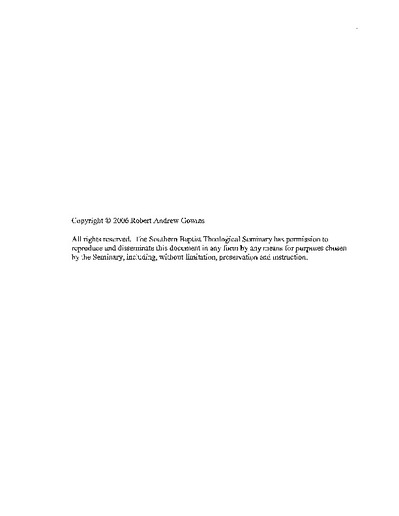An analysis of open and closed Sunday school groups in growing Southern Baptist churches
Subject
Southern Baptist ConventionSunday schools--Baptists
Sunday schools--Evaluation
Sunday schools--Southern States
Sunday schools--Open admission
Church growth--Baptists
Abstract
This dissertation examined the relationship between open and closed Sunday school groups and real and perceived measurements of church health in growing Southern Baptist churches. The concern for Sunday school growth was explored through an analysis of the relationships between open and closed Sunday school groups in 1,013 small and medium sized Southern Baptist churches that were experiencing significant positive growth, in the geographic South.
According the precedent literature, research, and an expert panel, the growth characteristics leadership, evangelism, fellowship, and ministry were expected to rank among the most significant of the measured growth factors. Data collected, however, demonstrated critical differences in the perceived significance of the identified growth factors. Sunday school members and leaders ranked discipleship, doctrine, prayer, and worship as the most significant growth factors.
The research also identified significant differences between the expected measurements and perceived measurements of open and closed Sunday school groups. Fifty-eight percent of all respondents perceived their Sunday school to be an open group; however, 78% of all respondents perceived Sunday school's primary purpose as instruction and discipleship; 5% perceived Sunday school's primary purpose as nurture and fellowship; and 17% perceived Sunday school's primary purpose as evangelism. Based upon the definitions of open and closed groups, both groups were expected to exhibit biases toward specific growth characteristics; however, there was no significant difference between how open groups and closed groups perceived discipleship, doctrine, and prayer. Both open and closed groups ranked doctrine, discipleship, prayer, and worship as the most essential characteristics of a growing Sunday school.
Of the eleven identified Sunday school and church growth characteristics, only four growth characteristics produced correlation coefficients ( r ) that demonstrated any level of significance: leadership, evangelism, fellowship, and discipleship. For most churches surveyed, there was a positive correlation between leadership within the Sunday school and an increased number of baptisms. Overall, there was a general decrease in average weekly worship attendance as the degree of significance in evangelism increased. There was a general increase in adult Sunday school enrollment as the perceived significance of fellowship decreased; as well as a negative correlation between fellowship and worship attendance; as the average weekly worship attendance increased as the perceived significance of fellowship decreased. Regarding the growth factor discipleship, there was a negative correlation between discipleship and the average weekly worship attendance as recorded by the research.
Collections
Related items
Showing items related by title, author, creator and subject.
-
The Sunday School Board, Southern Baptist Convention : its history and work
Frost, James Marion (Nashville, TN : Sunday School Board, Southern Baptist Convention, 1914) -
Proceedings of the ... annual session of the North Texas Baptist Association; also ... sessions of the Woman’s District Convention, and District Sunday School and B. Y. P. U. Conventions
North Texas Baptist Association (W. V. Smith and Co., 1895) -
Proceedings of the ... annual session of the North Texas Baptist Association; also ... sessions of the Woman’s District Convention, and District Sunday School and B. Y. P. U. Conventions
North Texas Baptist Association (The Herald Publishing Co., 1899)

